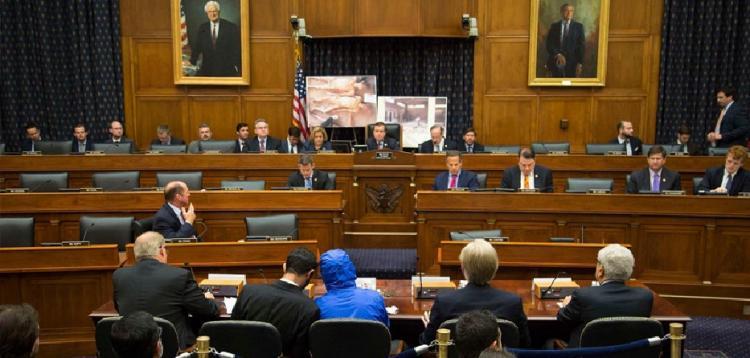Syria TV has learned from diplomatic sources in the US capital Washington with links to the US State Department that there is a new list of Syrian figures being considered to be added to the list of funders and backers of the Assad regime who would have sanctions imposed on them.
The sources told Syria TV that adding and approving these names would mean they took part in oppressing the Syrian people and so therefore needed to be subject to American sanctions in accordance with the Magnitsky Act, which stipulates punishments for human rights violators around the world.
In this respect, Joe Wilson, Republican Representative and member of the Committee on Foreign Relations, said in a statement presented in Congress and viewed by Syria TV on Anti-Corruption Day that, “Today, Syria has become a prominent milestone and example for what happens when corrupt governments refuse to reform and respond to peaceful demands with violence.”
The statement said: “The Assad regime is still denying Syrians their basic human rights and bombing its people indiscriminately and intentionally, starving residents, and blaming the United States and other Western countries for the horrible conditions in Syria and experienced by the Syrian people, all to protect the power and interests of corrupt officials who are part of Assad’s network.”
The statement gave a sample of names that were part of this network: Fahd Darwish, Samer Dibs, Samir Anis Hassan, Samer Oueis, Kanaan Kanaan, Tamim Badr, Mahran Khwanda, Osama Ali Zeoud, Iyad Habib Betinaneh, Tarif al-Akhras, and Fares al-Shihabi.
The statement said that the United States would, “target these individuals and impose sanctions on them because of their corruption and their theft from the Syrian people.
“In response to the widespread calls for change, the United States must continue a relentless campaign against corruption.”
The Magnitsky Act used against these names is a draft law by Republican and Democratic members in American Congress, approved by President Barack Obama in December 2012. The law was first used to punish Russian figures responsible for the death of the tax adviser Sergei Magnitsky in a Moscow prison in 2009.
This article was translated and edited by The Syrian Observer. The Syrian Observer has not verified the content of this story. Responsibility for the information and views set out in this article lies entirely with the author.


